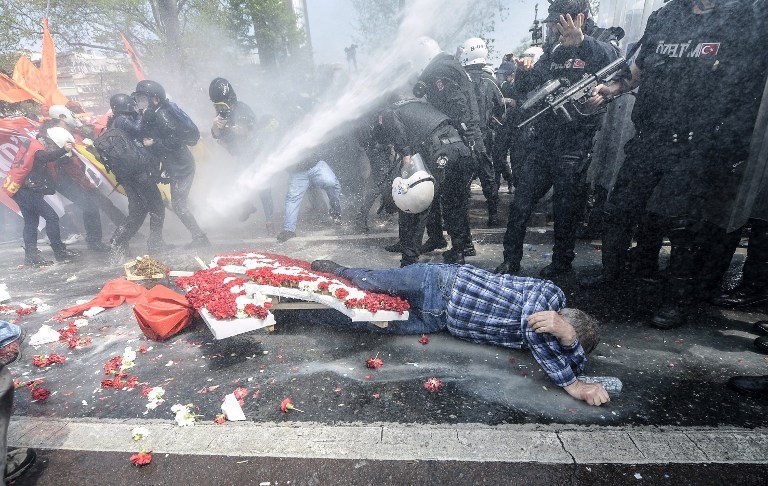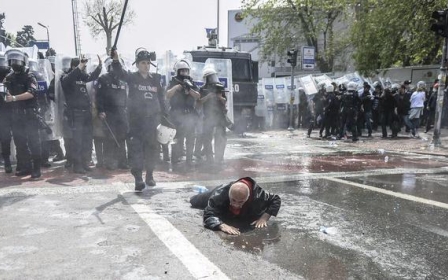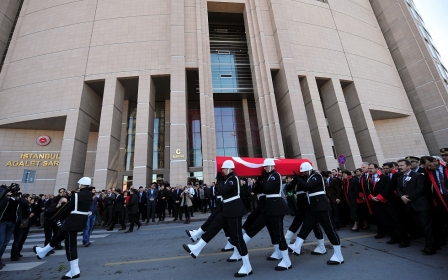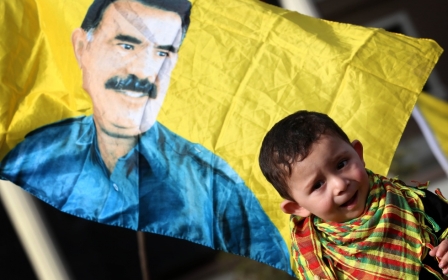Turkey paying for protest crackdown

Turkey’s “two cultures” - Islamic and secularist - collided on Saturday when conservative shopkeepers chased and even beat up demonstrators trying to mark the day they regard as “the workers’ holiday”. "We are Muslims and they are terrorists," a shopkeeper was reported as telling the Istanbul daily Hurriyet.
May Day has long been regarded as the peak festival of the year for the Turkish left and workers’ movements, but for most of the past four decades it has been virtually impossible to celebrate it with a rally in the country’s big cities.
Until 2010, the ban related to troubles on May Day 1977, when unknown persons, accused by the left of being government provocateurs, fired into a crowd in Taksim Square, killing 34 people and wounding about 136 others.
May Day 2015 did not see violence on that scale, but it reopened wounds as government and metropolitan demonstrators were once again locked in confrontation.
Even before protests initially against the development of Istanbul’s Gezi Park next to Taksim Square in the summer of 2013, the government routinely clamped down on most large-scale demonstrations in Taksim Square, the symbolic heart of Istanbul.
This year, a ban on all demonstrations was announced weeks ahead of 1 May, and 10,000 police and anti-personnel vehicles were moved into the square a few days in advance. To prevent large crowds forming, much of the city’s public transport was closed for the day.
This was despite a statement from Prime Minister Ahmet Davutoglu the previous day that “symbolic” celebrations, as opposed to mass protests, would be permitted. President Recep Tayyip Erdogan, however, described the practice of holding May Day demonstrations as “wrong and evil-minded”. He also told a group of protesting workers in the southeastern city of Batman demanding better working conditions “not to be ungrateful”.
Despite this, crowds of demonstrators in Istanbul ventured out into the Taksim Square from 9am onwards, though not on the scale of 2013. Tempers flared instantaneously, and there was a swift police clampdown. Amid scuffles, fights, and beatings up, 364 people were detained and 18 injured, at least one seriously. Government sources said six police were injured.
Ankara and Izmir also experienced outbreaks of disorder, but these were relatively uneventful compared with Istanbul.
Greater freedom for protests and demonstrators was one of the European Union’s pre-conditions for agreeing to the opening of negotiations for EU membership in 2005, negotiations that have now dragged on inconclusively for nearly a decade.
The clampdown on forms of dissent that are taken for granted in most Western democracies suggests that, even though the talks continue, the tide of events is pulling Turkey steadily further away from what was once its overriding goal of EU membership. It may also be moving the country away from from democracy as usually understood in the EU.
The Ankara government increasingly seems to regard any kind of challenge, even on social media, as a danger. Almost every day brings a new prosecution of someone who has criticised - or in official eyes, insulted - the president. This past week, for example, a lawyer was released after a week in prison for comments made on social media, but he will still face trial.
The threat the government seems to take most seriously, however, does not come from the likes of the Taksim protesters, but from the Gulen movement, a modernist Sufi Hanefi brotherhood led by an exiled preacher who moved to the US in 1999 and, until a year-and-a-half ago, was regarded as a close ally of the government.
The Gulen movement, at its peak, had a network of followers throughout the country in schools, universities, the police and the judiciary. In 2013, prosecutors, judges, and police launched an abortive series of corruption investigations against figures very close to the government.
The crackdown on Gulenists in the police and judicial services continues, and though the movement’s power appears to have been broken, it is still taken so seriously that, on 30 April, it was revealed that the National Security Council had revised Turkey’s supposedly top-secret “Red Book” specifying security threats against the country to include the “parallel state”, as the government describes the Gulenists.
Periodic purges of police and Justice Ministry officials allegedly linked to the movement continue. Last week, two judges who ordered the release of 76 policemen suspected of Gulenist links were themselves arrested.
Further action against the movement, described by the president as a “gang of treachery” is promised. This apparently forms part of the ruling Justice and Development Party (or AKP) campaign for the 7 June general elections.
President Erdogan hopes to win more than 400 seats in the 550-member Grand National Assembly, thus enabling him to introduce an executive presidency and implement constitutional changes as he sees fit. But observers think his prospects of getting as high a percentage of the poll as he did at Turkey’s last general elections, in 2011, are receding.
Some opinion polls suggest that the AKP might even have to form a coalition government. How would it react to this? A close colleague and advisor to the president has warned that if the government does not get a majority, it would simply form a minority government and then go back to the country at the earliest opportunity.
So whether it is dealing with demonstrators in the streets, critics in the social media, or rival networks in the public service, the government’s invariable tactics seem to be intransigence and refusal to compromise.
Given the absence of effectual political alternatives among Turkey’s opposition parties, this may work. But it is a policy with a high cost. International market confidence in Turkey is ebbing away, less because of economic performance (though that has slightly weakened) than because of the tense political climate. The exchange rate for the Turkish lira against the US dollar has plunged in the past two months and is down around 15 percent this year, and political confidence, or the lack of it, appears to be the cause.
Turkey’s May Day demonstrators, like the Gezi Park protesters two years ago, have achieved none of their goals, but they do seem to have shown that trying to govern without consensus is costly.
- David Barchard has worked in Turkey as a journalist, consultant, and university teacher. He writes regularly on Turkish society, politics, and history, and is currently finishing a book on the Ottoman Empire in the 19th century.
The views expressed in this article belong to the author and do not necessarily reflect the editorial policy of Middle East Eye
Photo: A man lies on the ground as Turkish police use a water cannon to disperse protestors during a May Day rally near Taksim Square in Istanbul on May 1, 2015 (AFP)
New MEE newsletter: Jerusalem Dispatch
Sign up to get the latest insights and analysis on Israel-Palestine, alongside Turkey Unpacked and other MEE newsletters
Middle East Eye delivers independent and unrivalled coverage and analysis of the Middle East, North Africa and beyond. To learn more about republishing this content and the associated fees, please fill out this form. More about MEE can be found here.





